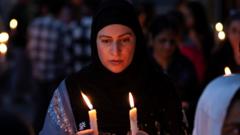Shabir Ahmad Dar, a long-time pashmina shawl seller from Indian-administered Kashmir, recently faced violent harassment in Mussoorie, Uttarakhand, alongside another Kashmiri vendor. Following a devastating attack in Kashmir that claimed 26 lives, members of a right-wing group targeted Dar, linking him and his friend to the violence solely because of their Kashmiri identity. A video captures the chaos as the assailants destroyed their stall and issued threatening demands for them to leave town. "We are too scared to go back," said Dar, highlighting the fear that now overhangs his identity.
The police did arrest the attackers, but their quick release after a fine raised questions about the seriousness of the authorities in addressing the hostility against Kashmiris. The atmosphere of fear has pushed Dar and fellow Kashmiri vendors out of Mussoorie, a place they once considered a second home. Harassment has surfaced in various forms—many Kashmiri students report being chased away from campuses or subjected to verbal abuse in public spaces.
Survivors of the Pahalgam attack have drawn attention to this troubling trend, insisting it is important not to conflate the actions of a few militants with the entire Kashmiri community. One grieving widow urged for a message of peace, appealing to refrain from scapegoating Muslims or Kashmiris amidst the grief that grips the nation. Yet, many have chosen to leave their lives in Indian cities and return to the perceived safety of their homes, despite lingering concerns there as well.
In response to the attack, security forces have launched a crackdown in Kashmir, leading to mass detentions, the shutting down of tourist destinations, and the destruction of homes believed to belong to suspected militants. This has incited fears among citizens about collective punishment, with doubts echoing regarding the fairness of such measures against innocent civilians. Prominent political voices criticized these aggressive actions and called for measured justice that protects the rights of innocents.
Shafi Subhan, another vendor, recounted how he previously enjoyed a supportive and welcoming environment in Mussoorie but has witnessed a stark shift to hostility. The long-standing conflict over Kashmir has bred a pervading atmosphere of suspicion, with Kashmiris feeling increasingly alienated as violence and tensions flare.
This volatility is compounded by the region's historical entanglement in conflict, where civilians bear the brunt of military responses to violence. An ongoing armed insurgency, along with political unrest, has led many to protest against unjust targeting of their community. The tragedy of their situation is threaded with communal grief, expressed through vigils and marches, as they seek solidarity while harboring fears for their own safety.
Indeed, many Kashmiris feel trapped within a cycle of vilification and retaliatory violence. Mohammad Shafi Dar, a daily wage worker, shared his painful ordeal, stating that his family is left homeless after military forces destroyed their house, asserting a collective punishment narrative. For many, these crises elevate existing anxieties about their identities and safety in an environment shaped by decades of strife, transforming their lives into a fragile existence marked by fear and uncertainty.




















